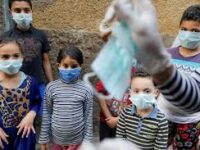
The Pharmacy Directorate of the Komfo Anokye Teaching Hospital (KATH) in Kumasi, Ghana’s second-largest health referral facility, has scaled up the production of hand sanitizers in the face of the coronavirus pandemic.
This is to ensure the availability of the product at all operational areas of the Hospital to curb the spread of the disease.
Dr. Baffour Opoku, Medical Director of the Hospital, said the products were made per the World Health Organization’s (WHO) specifications and standards, stressing that, their efficacy was guaranteed.
He was speaking to the Ghana News Agency (GNA) in Kumasi, on the sideline of a working visit to the facility by the Metropolitan Health Committee under the Kumasi Metropolitan Assembly (KMA).
The visit was to enable the Committee know at first hand, the emergency response programmes and measures instituted by Management of the Hospital to manage the possible spread of the disease in the metropolis.
KATH has currently set up isolation and five-bed quarantine centres to deal with suspected cases of the disease, of which Ghana had so far recorded six confirmed cases.
Additionally, the temperature of all patients and visitors coming to the Hospital are also taken before being allowed inside the facility at the main checkpoints.
The facility had been working with the Kumasi Centre for Collaborative Research (KCCR) and Noguchi Memorial Institute for Medical Research to test all suspected cases of the pandemic.
“We can say on authority that no case relating to coronavirus has been recorded here at KATH,” Dr. Opoku stated.
Dr. Oheneba Owusu Danso, Chief Executive Officer (CEO) of KATH, appealed to the government to strive to make available at key public areas infrared thermometers, to be able to take the temperature of the citizenry and visitors from a distance.
Mr. Osei Assibey-Antwi, the Metropolitan Chief Executive (MCE), lauded the government for its prompt response to stemming the spread of the deadly disease.
Coronavirus until its outbreak in Wuhan, China, in December last year, had not been previously identified in humans.
Common signs of infection include respiratory symptoms, fever and cough, shortness of breath and breathing difficulties.
In more severe cases, infection can cause pneumonia, severe acute respiratory syndrome, kidney failure and even death.





